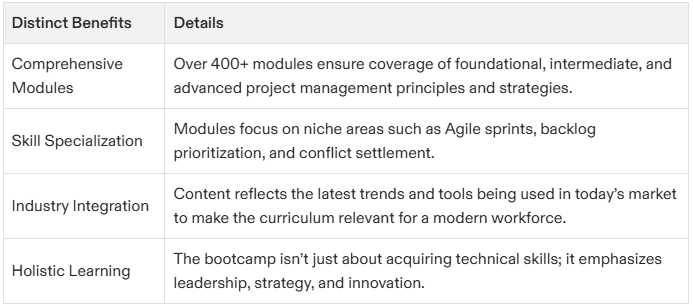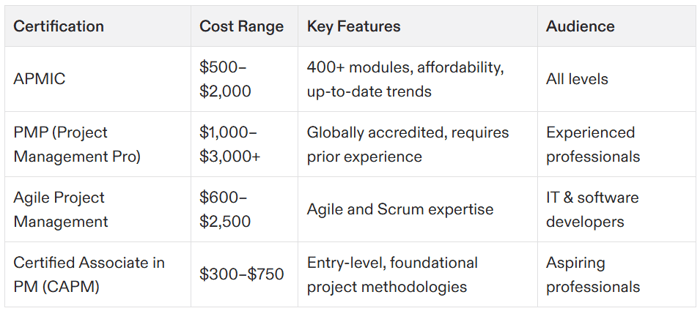Table of Contents
- Why Choose a Project Management Certification University Program?
- How Does a Project Management Certification University Differ From Other Options?
- Who Should Enroll in a Project Management Certification University Program?
- Benefits of APMIC vs. University-Based Certifications
- Key Skills You’ll Learn
- Advanced Planning and Scheduling:
- Agile and Hybrid Approaches:
- Risk Management Strategies:
- High-Impact Leadership and Team Management:
- Budget Oversight and Financial Reporting:
- Stakeholder Management and Communication:
- Quality Assurance and Control:
- Change Management:
- Less Commonly Known Facts About Project Management
- Conclusion
- FAQs
In the present job market it is important more than ever to upgrade your skills and abilities. A Project Management Certification from a reputable university is a smart way to improve your employment opportunities and position yourself ahead of your competitors. University affiliated certifications are unique in that they combine the best of academic research and training with real life practical application, which will help you learn how to manage finances, people and risks in any project independent of its scale.
This type of credit can also play a role in helping you meet certain job qualifications, and it shows that you care about your career enough to keep learning as the world changes. This article will provide a complete overview of university based project management certification programs, their benefits, how they compare to other certifications, and why something like APMIC’s extensive certification program (with 400+ modules!) might be the best choice yet.
Why Choose a Project Management Certification University Program?
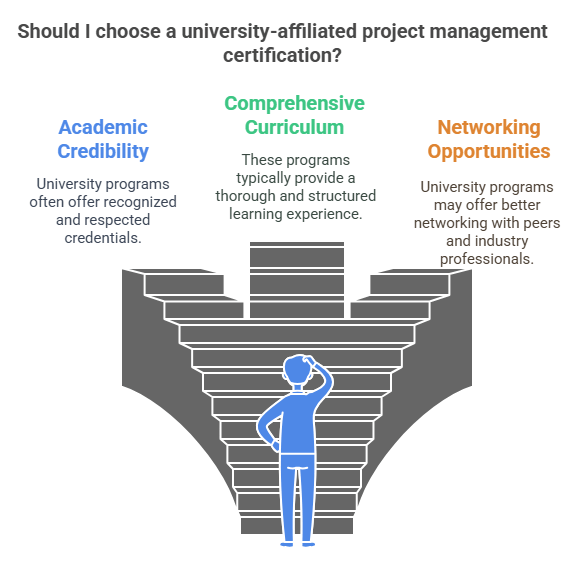
University-affiliated project management certifications stand out for their unique benefits compared to standalone professional credentials. Here’s a closer look at what makes them the right choice for many aspiring and seasoned project managers:
Academic Rigor and Deep Theoretical Foundation:
University programs excel in providing a robust theoretical framework. This approach allows you to develop a profound understanding of core project management principles, including scope management, quality assurance, and risk mitigation. You’ll also delve into the nuances of popular frameworks like Agile and Scrum, understanding not just the "how" but the "why" behind each methodology. This depth of knowledge is crucial for making informed decisions and adapting to unforeseen challenges.
For an example of a well-recognized project management certification program, the Project Management Certification University of Washington offers a comprehensive program that combines academic rigor with practical experience, making it an excellent option for advancing your career.
Globally Recognized Accreditation:
The gold standard for any certification program is its accreditation. Most university-affiliated programs are backed by leading accreditation bodies such as the Project Management Institute (PMI) and PRINCE2. This accreditation ensures that your certification is recognized and respected across industries and geographies, significantly enhancing your career mobility.
Unparalleled Networking Opportunities:
Enrolling in a project management certification university course opens doors to a vibrant network of professionals. You’ll connect with faculty members who are experts in their fields, alumni who have successfully navigated the project management landscape, and peers who share your passion for excellence. These connections can provide invaluable career guidance, mentorship opportunities, and even job prospects.
The Perfect Balance: Theory and Practice:
Effective project management requires more than just theoretical knowledge. University programs understand this, which is why they often incorporate a rich blend of case studies, group projects, and capstone projects. This hands-on approach ensures that you not only grasp the underlying concepts but also learn how to apply them to real-world scenarios. You’ll gain practical experience in problem-solving, decision-making, and team collaboration, preparing you for the challenges you’ll face in your career.
Elevated Career Credentials and Enhanced Reputation:
A university-branded certification carries significant weight in the eyes of employers. Graduating with a certification from a well-respected university immediately elevates your professional profile, signaling to potential employers that you possess a serious commitment to your field and versatile competence. This can translate into better job opportunities, higher salaries, and faster career advancement.
How Does a Project Management Certification University Differ From Other Options?
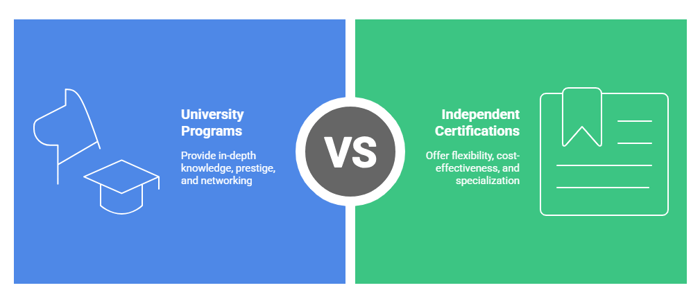
The project management certification landscape is diverse, with options ranging from independent certifications like PMP and CAPM to specialized programs like APMIC. Here’s a breakdown of how university programs compare:
Depth of Knowledge: University programs typically offer a more in-depth exploration of project management principles and theories, providing a broader understanding of the field.
Brand Recognition: Certifications from well-known universities often carry more prestige and recognition than lesser-known independent certifications.
Networking: University programs offer extensive networking opportunities with faculty, alumni, and peers, which can be invaluable for career advancement.
Cost: University programs tend to be more expensive than independent certifications, reflecting the resources and reputation associated with the institution.
Time Commitment: University programs often require a significant time commitment, typically ranging from 6 to 12 months.
Flexibility: Independent certifications often offer more flexibility in terms of scheduling and learning pace.
While university certifications offer undeniable value, advanced independent certifications like APMIC provide unparalleled flexibility, highly detailed modules, and tailored tracks for diverse industries, making them a compelling alternative for professionals seeking a more focused and efficient learning experience.
For those looking to pursue a flexible option with the same academic rigor, the Project Management Certification at Penn State provides a comprehensive, highly regarded program.
Who Should Enroll in a Project Management Certification University Program?
A university-affiliated project management certification program is an excellent choice for individuals in various stages of their careers:
Recent Graduates: For those just starting their career journey, a university-affiliated program offers the structure and guidance needed to develop core competencies in project planning, execution, and risk evaluation. It provides a solid foundation for a successful career in project management.
Mid-Level Professionals: Individuals with some project management experience can leverage a university certification to enhance their resume, transition into leadership roles, or expand their technical expertise. It demonstrates a commitment to professional development and can open doors to new opportunities.
Career Switchers: If you're transitioning from one career field to another, a university program provides the foundational knowledge and skills needed to establish credibility in your new domain. It can help you make a smooth and successful transition into the world of project management.
Professionals Seeking Accreditation with Academic Prestige: The prestige of earning a certification from a renowned university, coupled with global recognition, can maximize the return on your investment in terms of effort, expenses, and career advancement.
Benefits of APMIC vs. University-Based Certifications
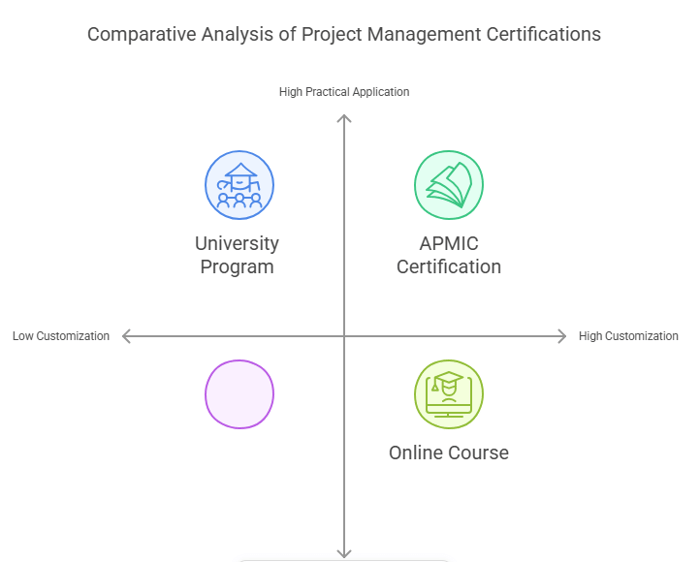
While a project management certification university program can be a great fit for some, certifications like APMIC surpass them in several key areas, including customization, content depth, and speed of delivery.
APMIC (Accredited Project Management International Certification) stands out as a leading alternative to traditional university-based programs, offering a unique blend of flexibility, depth, and practical application.
Key Skills You’ll Learn
Regardless of whether you choose a university-affiliated program or a professional certification like APMIC, you’ll gain essential skills for project management success. These certifications ensure you're not just knowledgeable but also ready to tackle real-world challenges in diverse industries.
Advanced Planning and Scheduling:
Planning is the cornerstone of successful project management. Certification programs equip you with the skills to break down complex projects into manageable phases, create structured timelines, and identify critical deliverables. You'll master tools like Gantt charts, resource allocation matrices, and project management software to ensure tasks are scheduled effectively and resources are optimized. This skill is vital for managing everything from technology rollouts to large-scale construction projects, ensuring on-time and efficient delivery.
Agile and Hybrid Approaches:
In today's fast-paced world, flexibility is paramount. Certifications introduce you to Agile, Scrum, and hybrid methodologies, enabling you to adapt workflows based on stakeholder feedback and changing project requirements. You'll learn sprint planning in Agile to deliver iterative progress and explore hybrid techniques that combine the structure of Waterfall with the flexibility of Agile. Armed with these methodologies, you can lead teams in rapidly evolving industries like software development, marketing, and product development.
Risk Management Strategies:
Effective project managers are adept at anticipating, identifying, and mitigating risks. Certification programs hone your ability to assess potential risks during project planning, using tools like SWOT analysis, risk registers, and probabilistic models. You'll learn how to create comprehensive contingency plans, conduct thorough risk assessments, and implement proactive measures to minimize disruptions from potential issues like supply chain delays, budget overruns, or scope creep. This skill ensures more consistent and controlled project outcomes, making you an invaluable asset to any organization.
High-Impact Leadership and Team Management:
Leadership is at the heart of successful project management. Certifications provide training in managing diverse teams, fostering collaboration, and resolving conflicts effectively. You'll gain insights into emotional intelligence, stakeholder communication strategies, and motivational techniques to inspire and empower your team. Through hands-on simulations and real-world case studies, you'll practice leading high-pressure projects, learning to stay calm, focused, and decisive while delivering results. This skill is particularly valuable for leading cross-functional teams in complex, multinational environments.
Budget Oversight and Financial Reporting:
Financial acumen is non-negotiable for project managers. Certifications ensure you grasp the intricacies of cost estimation, budget tracking, and financial reporting. You'll learn how to use financial management tools and techniques like Earned Value Management (EVM) to monitor project performance, track expenses, and identify potential budget overruns. Additional training focuses on balancing resources, managing labor costs, and handling unexpected expenses without compromising project scope or quality. This knowledge keeps projects on track and within budget, establishing you as a reliable and trustworthy figure in any organization.
Stakeholder Management and Communication:
Successful project managers excel at managing stakeholder expectations and communicating effectively with all parties involved in a project. Certifications provide training in stakeholder analysis, communication planning, and conflict resolution. You'll learn how to identify key stakeholders, understand their needs and expectations, and develop communication strategies to keep them informed and engaged throughout the project lifecycle. This skill is essential for building strong relationships, gaining buy-in, and ensuring project success.
Quality Assurance and Control:
Delivering high-quality results is a critical aspect of project management. Certifications provide training in quality assurance and control techniques, enabling you to ensure that project deliverables meet the required standards and expectations. You'll learn how to develop quality management plans, conduct quality audits, and implement corrective actions to address any deficiencies. This skill is essential for minimizing errors, reducing rework, and ensuring customer satisfaction.
Change Management:
Change is inevitable in project management. Certifications provide training in change management principles and techniques, enabling you to manage changes effectively and minimize their impact on project outcomes. You'll learn how to develop change management plans, assess the impact of proposed changes, and implement strategies to ensure a smooth transition. This skill is essential for maintaining project momentum and achieving desired results in a dynamic environment.
By mastering these skills, you'll not only excel in project management but also position yourself as a leader capable of handling diverse challenges across a wide range of industries. Whether you're preparing for high-stakes negotiations, streamlining project execution, or mitigating potential risks, these certifications provide you with the right tools and knowledge to succeed.
Less Commonly Known Facts About Project Management
Ancient Roots:
Project management principles can be traced back to ancient civilizations, such as the construction of the Egyptian pyramids and the Great Wall of China.
(Source: Wikipedia - Project Management History)The Manhattan Project:
The Manhattan Project, which developed the first atomic bomb, is considered one of the most complex and challenging projects in history. It involved thousands of scientists, engineers, and technicians working in secrecy across multiple locations.
(Source: Wikipedia - Manhattan Project)The Critical Path Method (CPM):
The Critical Path Method (CPM), a widely used project management technique, was developed in the 1950s to manage the construction of chemical plants.
(Source: Wikipedia - Critical Path Method)Earned Value Management (EVM):
Earned Value Management (EVM), a technique for measuring project performance, was originally developed by the U.S. Department of Defense.
(Source: Wikipedia - Earned Value Management)The Standish Group's Chaos Report:
The Standish Group's Chaos Report, published annually, provides insights into the success and failure rates of IT projects. It has consistently shown that a significant percentage of IT projects are challenged or fail.The Iron Triangle:
The Iron Triangle, a fundamental concept in project management, represents the three competing constraints of scope, time, and cost. Balancing these constraints is essential for project success.
(Source: Wikipedia - Triple Constraint)
Conclusion
Pursuing a recognized project management certification, whether through a university program or a professional organization, is an undeniably valuable investment for professionals seeking to build a rigorous academic foundation and enhance their career-enhancing skills. However, if flexibility, depth, and real-world application are your top priorities, consider advanced options like APMIC's project management certification.
With over 400 modules and a focus that balances speed with comprehensive learning, APMIC caters perfectly to the demands of modern organizations. Ready to conquer the PM world? Check out our best "PMP Certification Prep Course" at APMIC and take control of your career path with certifications that resonate with the future of the workforce!
FAQs
Why choose a project management certification university program over other options?
University certifications emphasize academic rigor, providing a global reputation and theoretical depth. However, professional programs like APMIC might be more advantageous for specialized tracks and a faster learning pace.
What is the duration of a university-affiliated project management certification?
Most programs range from 6–12 months. However, faster self-paced alternatives like APMIC offer flexibility, allowing you to certify within weeks based on your schedule
Are university programs expensive, and are they worth it?
They can cost anywhere from $5,000–$15,000. While they're valuable for some, affordable programs like APMIC provide even better ROI by matching industry standards at a fraction of the investment.
Can I transition industries with this certification?
Absolutely! Certifications from universities or professional organizations open doors in fields like IT, healthcare, marketing, and consulting. If industry-switching is a priority, APMIC's modular setup provides tailored strategies for your target field.
How does APMIC compare to a project management certification university program?
APMIC delivers unrivaled flexibility with over 400 modules, making it ideal for beginners to senior managers. Unlike traditional paths, its self-paced curriculum adapts to your career goals dynamically.



